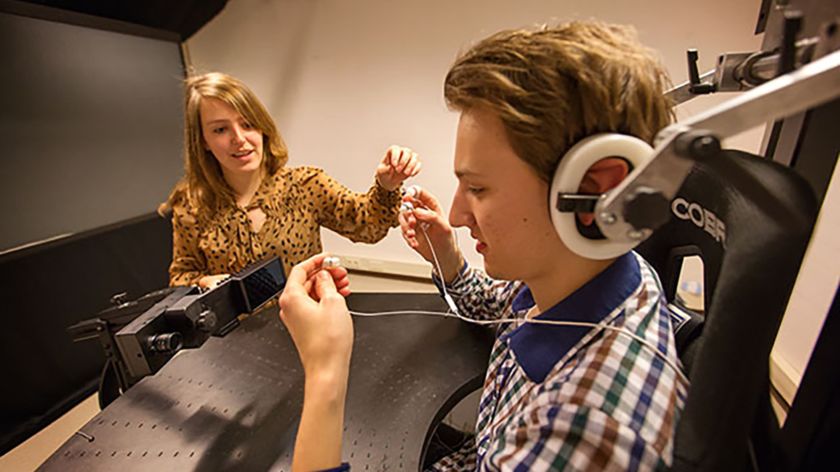Wanted: test subject (m)
It’s inconvenient for researchers to have so many women on campus. They’re having trouble finding male test subjects.
The notice board above the printers in the Huygens building is filled with brightly coloured flyers. ‘Participants wanted’, they say. Or ‘Test subjects wanted’. Or, more to the point, ‘Men wanted!’ The Huygens building is one of the rare locations on the Radboud University campus with more male than female students. This is why it’s such a popular hunting ground for researchers in search of male test subjects. Why?
Here’s how it works. A lot of research in psychology and neurology is based on experiments with student test subjects. After all, students are usually young and healthy, easy to find at universities, and prepared to take part in a research study for a small fee. There’s only one problem with the Nijmegen student population: most of them are women.
‘We have no problems finding female test subjects’
Lieke Hofmans, PhD student at the Donders Institute, is one of the researchers who often puts up flyers in the Huygens Building. She’s conducting a large-scale study on the impact of the hormone dopamine on the brain. ‘A fifty-fifty male/female population is a strict requirement for our study,’ she explains. ‘We have no problems finding female test subjects. But it’s not always easy finding enough men.’ The search for men is costing Hofmans precious time, and in the worst-case scenario may slow down her research track.
Hofmans is clearly not the only one facing this problem: every study in psychology or neurosciences where gender plays a role includes as part of its methodology the requirement of an equal number of male and female test subjects. ‘In neuroscience, research on single gender test subjects is less and less accepted,’ explains Erno Hermans, senior researcher at the Donders Institute. ‘I study stress hormones. This means I have to take into account the effect of sex hormones and I nearly always need an equal distribution of men and women.’ The only studies where gender plays a less crucial role are studies on basic biological processes that are essentially identical in men and women. Hermans: ‘For example research on our visual system. It doesn’t matter so much there.’
Flyers or posters
In psychological research too, gender plays an important role. Inge Rabeling is lecturer in Psychology and Bachelor’s thesis coordinator. ‘As a rule we don’t make it compulsory for our students to use an equal number of male and female subjects,’ says Rabeling. ‘Unless this is relevant for their research subject. If students want to compare men and women, then they should try to come up with more or less equal numbers for both groups.’ Rabeling’s students also sometimes struggle to find male participants for their research. Rabeling: ‘In these cases we advise them to actively recruit participants, for instance by hanging up flyers or posters at faculties with a largely male student population. Or to look for participants outside the University. In our experience, students usually do manage to find enough participants.’
The Donders Institute and the BSI Lab work with the Sona system. In Sona, students can register as test subjects and take part in ongoing experiments. However, of the more than 3200 students registered in Sona, more than 2400 are women. This incredible imbalance is partly due to the large number of psychology students among users. In their first year, psychology students have to earn ‘test subject credits’, which they obtain by taking part in research. And with 74% of students being women, Psychology is one of the most women-dominated study programmes on campus.
Nevertheless, Hermans still sees Sona as a blessing. The system also offers an immediate solution to the shortage of men, he says. ‘For example, you can temporarily ‘switch off’ your experiment for women or set a specific quota for each gender. All you have to do is keep recruiting until you reach your ideal male-female proportion.’ The system also makes it possible to send male users an e-mail to draw their attention to a specific study. And if all else fails, there’s always the notice boards in the Huygens building.


